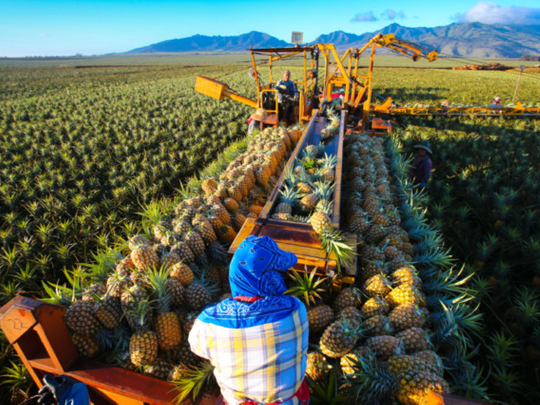
Exports of food products from the US to the UAE stood at around $1.07 billion (about Dh3.9 billion) last year, an increase of 5 per cent over the previous year, according to the US Department of Agriculture.
The UAE is the largest market in the GCC for US food, followed by Saudi Arabia. American food is popular especially among resident expats and tourists. The advantages for US exporters of consumer-ready food products are numerous. These include the fact that US products are seen as high-quality items and the weaker dollar is an advantage as the UAE’s currency is pegged to it. The high regional per-capita income and broad familiarity with US culture are other positive aspects. There are also low tariffs and relatively transparent import procedures.
Among the largest US food and beverage exporters to the UAE are Kraft Foods, Kellogg, Cargill, Mars, Hershey’s, Tyson Foods, Dole Food Company, Procter & Gamble, Del Monte, Sara Lee, Heinz, Dr Pepper, Dean Foods, Coca-Cola and PepsiCo.
The latest Business Monitor International (BMI) country report on the UAE painted a positive picture for future food consumption in the country. BMI has forecast food consumption to grow at an annual rate of 6.25 per cent over the next five years. The growth in food consumption will be driven by an increasing population and rising disposable income, with growth in the mass grocery retail sector helping cater to the demand. >
Currently, per capita food consumption in the UAE stands at 1.48 tonnes per annum, which is 50 per cent higher than that of the GCC average, which stands at 949.1 kilograms according to a report by research firm Alpen Capital. It also estimates that food consumption will grow by 3.1 per cent between 2012 and 2017.
Making connections
Food import from the US to the UAE is driven by the Office of Agricultural Affairs at the US Department of Agriculture, whose regional office is housed at the US Consulate in Dubai. The office promotes US food exports to the GCC through trade shows such as the Gulfood Exhibition, says Jude Akhidenor, the US Regional Agricultural Attaché for the UAE.
“Our office works as a facilitator by providing US food suppliers trade leads, reports on local and regional food import regulations and connecting them with food importers and distributors in the region,” he says.
The US also is traditionally one of most prominent exhibitors at the Gulfood Exhibition at the Dubai World Trade Centre. In February, its pavilion featured 137 companies in 181 booths. It was the largest country pavilion at the expo.
Furthermore, the UAE’s casual dining segment is dominated by US fast-food chains, with American brands making up almost the half the $600 million market, which is expected to grow by 30 per cent over the next four years.
Brands in this segment include McDonald’s, TGI Fridays, Burger King, Kentucky Fried Chicken, Dunkin’ Donuts, Applebee’s, Johnny Rockets, Chili’s, Ruby Tuesdays, Fatburger, Subway, Pizza Hut and Hardee’s.
Smaller brands such as Shake Shack, Texas Roadhouse and Red Lobster have launched new restaurants in the UAE only recently as a starting point for a GCC-wide expansion. The newest addition was Steak Escape, a part of US-based fast-food chain HMS Steak, which is set to open ten new Steak Escape outlets across Dubai and Abu Dhabi over the next three years. “The UAE’s diverse cultural mix provides us the unique opportunity to promote Steak Escape’s rich history of Philly- [Philadelphia] style food,” said Ibrahim Shallal, Director, HMS Steak.
More brands, more service
A brand that recently opened restaurants in Dubai is Cheesecake Factory, a chain of full-service restaurants specialising in the dessert its named after. Alshaya Group, the chain’s regional partner, launched the world’s largest Cheesecake Factory restaurant with 526 seats in Mall of the Emirates this year.
International House of Pancakes, or Ihop, the popular American pancake chain serves a similar customer base in Dubai and was also brought in by Alshaya Group in 2012.
Another reason why US fast-food chains have such a high market share is that they are very good at producing modular food-on-the-move. They have set up attractive franchise schemes that allow fruitful partnerships, and they adapt instantly to the needs of the market (for example, almost all fast-food chains offer halal food in the UAE), and are keen to adapt their offerings “to the region’s epicurean traditions”, as Shallal puts it. 7








